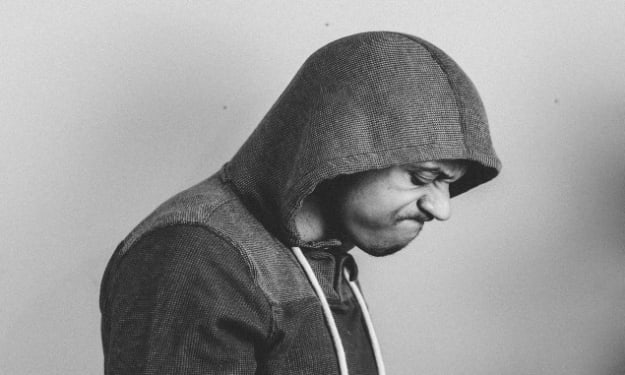
In London during summer, the sun doesn’t go down on time, it lingers long after the children have gone to sleep. In the morning, it peeks out a little too early. I was used to an equal division of time between day and night. But for the first time in weeks, I was grateful for this early appearance and late departure of the sun. I was also grateful for the searing heat. As I sat on the park bench watching parents reluctantly push their kids on the swings or cheer them as they swung on the monkey bar, I over analysed, like an aged professor, the events in my life that led me to that bench. There I sat, surrounded by happy people who couldn’t see the tears in my eyes or the bruises that were so visible on my dark skin.
Then a frame blocked the sun that my bruised body so desperately needed. I had not eaten for days and a dose of vitamin D was my only hope for nutrition.
“Hi!” he said.
I looked up with one eye squinted. There stood in front of me a tall man who appeared to touch the sky. His whole appearance – from how he was dressed to his manicured hair – told me he was way above my league. But I didn’t want to be rude. “Hello!”
“What happened to your face?”
“I fell!” I answered with a hint of anger in my voice. I mean what did it matter to him that I had a bruised and wounded face.
“You fell?”
"What do you care?” I asked angrily. All I wanted was to be left alone with my thoughts. However, for a few seconds, I worried he might be the police. My heart raced. I did not want to be deported looking like a boxing heavy weight. I was about to tell a lie when he spoke with a kindness that caught me off guard.
“I am a doctor and those are not injuries from falling. But…. I can help you.”
The tears I’d been holding for weeks threatened to flow and wreck my already ruined face. I tried to speak, but the lump in my throat rendered me incapable of speech.
I stood up ready to walk away with whatever dignity I could manage.
“I can help you,” he said again. This time his voice was that of concern. I stopped.
“Thanks,” I said.
He extended his hand, “my name is Mark, nice to meet you.”
“My name is Kayla, nice to meet you too,” I said as I extended my swollen hand.
The night before I was held captive by a group of women, women who I thought were my trusted friends – I’d known them since childhood. I was held captive and beaten to within an inch of my life by these friends. I couldn’t go to the police; I couldn’t call my family – they were thousands of miles away and besides, there was nothing they could do. None of them, (my family and my friends), knew I was in London. My best friend, Stella, knew where I was, but calling her was futile too – there was nothing she could do from Nairobi.
A few weeks before that night, I landed at Heathrow Airport one May morning, the London sky glittered with silver and golden rays: I was full of hope. My trusted friends picked me up. Our first stop was a fancy restaurant for breakfast where my friends regaled me with tales of how they’d made millions of Kenyan shillings. Of course, I believed them because I had watched as they transformed their parents’ mud huts into bungalows with tiled roofs. I had watched as they, effortlessly, educated every one of their siblings. I had watched as they, effortlessly, set up businesses for their brothers – I, too, wanted my hand in that honey jar. As we ate half-cooked eggs, the four women complimented me on how classy I looked.
I had travelled light as advised by the women: – I wasn’t overly made up or dressed inappropriately or wearing cheap weaves, I looked every inch the businesswoman I told the embassy officials I was. I had one medium-sized suitcase and my carryon was simply an oversized designer handbag I’d spent a fortune on in Toi market. Other than my passport, every document in that designer bag was fake, but proof that I owned a thriving business in the capital. Nothing about me said I was a simple receptionist earning less than £10 a day.
The £2,000 in my purse was loaned to me, by the women, in case the border immigration officers asked to see “cash on you”, otherwise I had business account statements showing I had millions of shillings. The nice immigration officer who interviewed me was more impressed by my age and beauty than the money. It didn’t strike him odd that a twenty-something person could have millions of shillings in some bank – later I heard mine was peanuts compared to most rich young Nigerians who visit the UK every day.
Mark, the kindly doctor-stranger said he would get a first aid kit from his car and I was to stay put. I smiled a crooked smile as every muscle on my face hurt. I watched him as he walked to his car: he was tall and muscly, and he walked with authority. His legs were thick like those of a rugby player – maybe he played when he was not saving lives, I wondered as I watched him disappear behind the park gate. For the first time since I arrived in the UK, I felt the rays of the sun on my skin.
I’d heard of a first aid kit before but had not seen one. Mark returned lugging behind him a green suitcase bigger than the one that carried all my UK possessions. It was like a mini-hospital – it certainly had more medical stuff than my local dispensary back in the village.
As it turned out I needed a few stitches here and there. I gladly let Mark stitch me up like an old sack. His hands were delicate and gentle. His voice was soothing and reassuring.
I told me him I had other injuries in other parts of my body that I couldn’t show him in the park. I knew then, he knew what had happened to me.
“I could take you to a hospital,” he said.
“No! I can’t afford a hospital visit,” those words came out of me before I could think of the consequences.
“You don’t need to pay,” he told me.
I wasn’t interested in the details of that statement, but it reminded me of the words of the immigration officer: “during your stay in the UK, you are not to access any public funds or services”: I was sure free hospital visits were the ‘public services’.
“Maybe you can examine me and decide if I need hospital treatment,” again those words came out of me before I could think of the consequences, it was like I was on fire for all the wrong reasons, reacting to him more than to the current situation.
I couldn’t tell Mark I was a visitor on an expired VISA, or that I owed people thousands of pounds, or that I had no money for food let alone anything else, or that I hadn’t eaten in days or any of the millions things I needed to share with someone.
It was for these reasons I did not hesitate when he asked me to go home with him. As we walked to his car, he plucked a rose from a nearby bush and gave it to me.
To be continued….
About the Creator
Things I hear
Educate, inspire, empower and transform lives by lifting the lid on societal, cultural and mental health issues through entertaining storytelling. Stories to inspire change on issues affecting the way we live, and how we view the world.






Comments
There are no comments for this story
Be the first to respond and start the conversation.